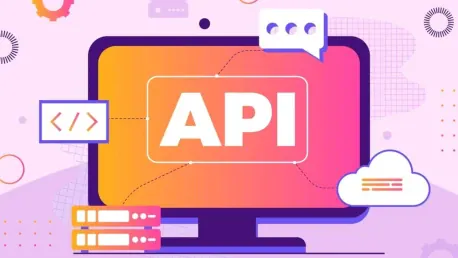In recent years, the software development landscape has undergone a significant shift towards an API-first approach. This change prioritizes API design at the early stages of development, moving away from traditional code-first methods. The 2024 State of the API Report by Postman, an API platform provider, highlights this transformation through insights from a survey of over 5,600 developers and API professionals. The report, now in its sixth edition, also leverages data from millions of users on the Postman platform. This shift underscores the growing recognition of APIs not just as integration tools but as core components that drive business value and technological innovation.
Growing Adoption of API-First Development
API-first development is increasingly becoming the norm among software developers. According to the report, a remarkable 74% of surveyed developers prioritize API design at the outset of their projects, a noticeable rise from 66% the previous year. This methodological shift is essential as it streamlines integration processes, ensures seamless inter-team collaboration, and enhances the efficiency of development cycles. By focusing on API design from the beginning, teams can preempt challenges that might arise during the integration phase, resulting in more robust and scalable applications.
Traditionally, developers would focus on writing code first and then create APIs as an afterthought for integration. However, the API-first approach flips this narrative by advocating for API design at the project’s inception. By doing so, developers are better equipped to handle integration challenges as they arise, leading to more robust and scalable applications. Moreover, the API-first paradigm underscores the importance of collaboration. As APIs serve as the communication bridge between different components or services, involving all relevant stakeholders—including business analysts, designers, and technical leads—from the beginning ensures that all requirements are met comprehensively.
Such inclusive planning fosters a comprehensive understanding of the project’s goals and technical needs, facilitating smoother execution. This collaborative approach not only improves the technical soundness of the project but also aligns it closely with business objectives. The early and meticulous design of APIs, as highlighted by the shift in development practices, has already shown to enhance productivity and reduce time-to-market for new applications.
Acceleration in API Production
API production has seen significant acceleration, driven by novel efficiencies in development tools and methodologies. The report reveals that 63% of developers can produce an API within a week, a substantial increase from 47% the previous year. This rapid turnaround is indicative of the technological advancements and streamlined processes that support modern API development. The swift API production resonates well with the agile development practices that are prevalent in the software industry, supporting faster iterations and more frequent deployments.
The quick production of APIs is not just a technical feat but a testament to the maturity of the API ecosystem. Tools such as Postman, Swagger, and OpenAPI have revolutionized how APIs are designed, tested, and deployed. These platforms offer features that simplify the end-to-end API lifecycle, boosting developer productivity and reducing time to market. Furthermore, the smooth API production fits well with the agile development methodologies prevalent in the industry. By enabling faster iterations and quicker deployments, API-first development aligns perfectly with agile methodologies, driving continuous improvement and innovation in software products.
The advancements in tools and platforms have thus played a crucial role in enabling this acceleration. In a development environment where time is of the essence, being able to produce reliable APIs quickly gives teams a competitive edge. This efficiency also allows developers to focus more on optimizing and fine-tuning their applications, knowing that the foundational API design is robust and reliable. As this trend continues, we can expect even more sophisticated tools to emerge, further reducing the time and effort required for API production.
Enhanced Reliability and Recovery
Adopting an API-first strategy has notable benefits in terms of reliability and recovery times. Organizations that prioritize APIs from the start experience quicker recovery from API failures, often within an hour. This reliability underscores the critical role APIs play in modern application infrastructures. Efficient API management platforms contribute significantly to this reliability. They provide robust monitoring and logging capabilities that help detect issues swiftly and offer tools for rapid response. As a result, downtime is minimized, and service levels are maintained, ensuring user satisfaction and trust.
Efficient API management platforms contribute significantly to this reliability. They provide robust monitoring and logging capabilities that help detect issues swiftly and offer tools for rapid response. As a result, downtime is minimized, and service levels are maintained, ensuring user satisfaction and trust. Additionally, the clear documentation that accompanies API-first development plays an essential role in recovery. When APIs are well-documented from the start, developers can easily troubleshoot and resolve issues without digging through extensive codebases. This transparency and accessibility of information expedite problem resolution, enhancing overall system stability.
Moreover, the reliability of APIs becomes crucial as they increasingly function as the backbone of many modern applications. Well-designed and reliable APIs facilitate smoother user experiences, as they ensure that services remain available and responsive even in the face of technical difficulties. Consequently, businesses can maintain their operational continuity and uphold their service commitments to customers. This reliability further cements the role of APIs as foundational components in application architectures, validating the strategic shift towards an API-first development approach.
Economic Value of APIs
APIs have evolved from being mere technical assets to becoming significant economic drivers. The report highlights that 62% of surveyed developers work with APIs that directly generate revenue. These APIs either facilitate direct monetization, enhance product offerings, or enable new business partnerships. Revenue-generating APIs represent a strategic asset for businesses, opening up new revenue streams through subscription models, pay-per-use systems, or by adding value to existing products. They foster partnerships by enabling other companies to integrate their services, creating a more extensive ecosystem and amplifying market reach.
Furthermore, APIs contribute to cost savings and operational efficiencies. By leveraging APIs, businesses can automate workflows, reduce redundancy, and improve scalability. This not only translates to direct financial benefits but also allows companies to focus on core business functions rather than reinventing the wheel for every integration. The economic value of APIs is further amplified by their role in enhancing competitive advantage. Companies that adeptly leverage APIs can introduce new features and services more rapidly, respond to market demands with agility, and create expanded value propositions for their customers.
APIs also facilitate innovation by enabling businesses to experiment and iterate swiftly. They provide a structured and manageable way to integrate external services, tapping into advanced functionalities without significant development overhead. In an ever-evolving tech landscape, the ability to quickly adapt and innovate using APIs can be a decisive factor in a company’s success. The economic impact, therefore, extends beyond immediate revenue generation to include long-term strategic advantages, setting the stage for continuous growth and innovation.
AI Integration Driving API Traffic
Reflecting broader technological trends, there has been a 73% increase in AI-driven API traffic on the Postman platform over the past year. APIs are becoming integral to AI and machine learning applications, showcasing their versatility and expanding role in modern technology landscapes. AI integration through APIs enables seamless access to powerful machine learning models and algorithms. Developers can easily incorporate features like natural language processing, image recognition, and predictive analytics into their applications without building these complex capabilities from scratch. This democratization of AI technology accelerates innovation and broadens its accessibility.
Moreover, the rise of AI-driven APIs highlights the symbiotic relationship between two transformative trends—APIs and artificial intelligence. As companies continue to leverage AI for advanced data analytics and automation, the demand for robust and scalable APIs is set to grow, further cementing their importance in the technological ecosystem. This trend underscores the increasing interdependence of varying technologies and the crucial role that APIs play in facilitating these integrations. AI depends heavily on APIs to function efficiently, given that many AI services require large amounts of data that need to be processed in real-time.
The integration of AI with APIs opens up limitless possibilities for innovation. It allows businesses to transform their operations by incorporating intelligent features without needing to invest in developing AI capabilities in-house. This approach not only saves time and resources but also brings advanced innovation within reach for many enterprises. As AI continues to evolve and its applications expand, the role of APIs in seamlessly integrating these capabilities into everyday workflows and products will likely grow, making them indispensable in the tech industry’s ongoing progression.
Cross-functional Collaboration and Security
In recent years, the software development world has seen a major shift towards an API-first approach. This new strategy puts the initial focus on API design, moving away from the older code-first methods. According to the 2024 State of the API Report by Postman, a leading API platform provider, this evolution is thoroughly examined through insights from a survey of more than 5,600 developers and API professionals. The sixth edition of the report also draws on data from millions of users on the Postman platform, offering a comprehensive look at trends and practices. The API-first approach highlights the increasing importance of APIs, not merely as tools for integration, but as vital elements that fuel business value and technological innovation. This shift aligns with the growing recognition that well-designed APIs are foundational to building scalable, efficient, and modern software applications. It also underscores the necessity for businesses to adapt to this approach in order to stay competitive and capitalize on new opportunities in the digital landscape.









